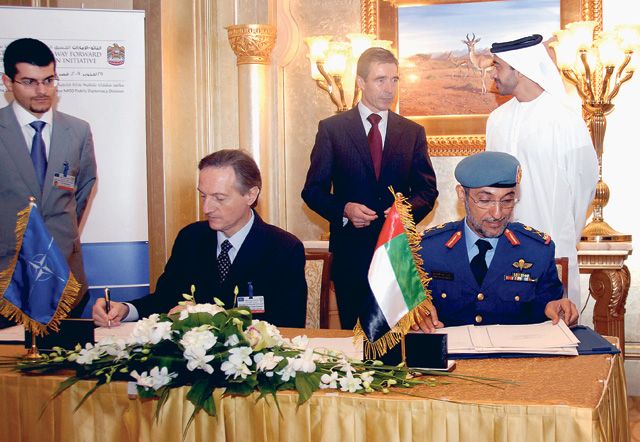Abu Dhabi: Nato's secretary-general has said that Israel must take all necessary steps to help normalise Palestinian life and stop all colony activity, while the Palestinians undertake to reform their civil institutions and security structures.
The unprecedented strong call by Anders Fogh Rasmussen was among five conditions he spelled out to achieve a "lasting peace in this region based on two states, Israel and Palestine, living side by side in peace and security," at the one-day International Conference on Nato-UAE Relations and the Way Forward in the Istanbul Cooperation Initiative (ICI) in the presence of Shaikh Abdullah Bin Zayed Al Nahyan, Foreign Minister.
Israel must also withdraw from Palestinian areas occupied after the Al Aqsa Intifada in 2000 and be ready to do what is necessary for an independent, viable, sovereign and democratic Palestinian state to be established, Rasmussen said.
Unequivocal end
On the other side, he said: "The Palestinians must declare an unequivocal end to violence and undertake visible efforts to end armed activity and all acts of violence against Israelis anywhere."
"The Palestinian leadership must issue an unequivocal statement reiterating Israel's right to exist in peace and security," he added.
According to the fifth condition, "the two parties must conclude an agreement that ends the occupation that started in 1967, which includes a just, fair and realistic solution to the refugee issue and a negotiated solution on the status of occupied Jerusalem that takes into account the political and religious concerns of both sides, and protects the religious interests of Jews, Muslims and Christians worldwide."
Rasmussen, who became Nato secretary general in August, said that "establishing new patterns of security cooperation across age-old geographical, cultural and religious boundaries will take persistence as well as patience."
Shaikh Abdullah gave a speech detailing that the Gulf region is of great strategic importance, not only as a major source of energy in the world but also to geopolitical and security considerations which require common regional and international cooperation.
"The world has changed due to rapid and deep revolutions and technical advances creating changes at the levels of information and communication, international relations, as well as the conventional military confrontations that cause the emergence of a new era of irregular warfare and electronic warfare," he said.
"As a result of these global changes, the UAE's policy, led by President His Highness Shaikh Khalifa Bin Zayed Al Nahyan, believes that it is necessary to find a more comprehensive concept of security in the region, considering that the threats to the Gulf region require attention not only at the regional level but also at the international level," he told the conference, which was also attended by Abdul Rahman Bin Hamad Al Attiyah, Secretary General of the Gulf Cooperation Council for the Arab Gulf States, and high-ranking officials from 28 countries affiliated to the North Atlantic Treaty Organisation (Nato).
"Since its accession to the Istanbul Cooperation Initiative, the UAE has worked hard to promoting common security issues as the appropriate framework for consultation, exchange of views and cooperation in the fields of defence arrangements, the enhancement of regional and international efforts to combat terrorism," he added.
During his address to the conference, Rasmussen said that Israel must take all necessary steps to help normalise Palestinian life and stop all colony activity, while the Palestinians undertake to reform their civil institutions and security structures.
With inputs from WAM













